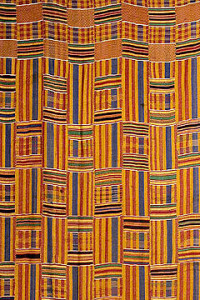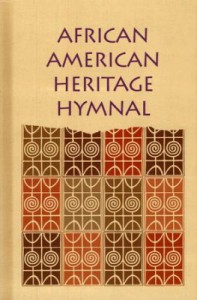February of each year is Black History Month in the United States.

Kente Cloth
This year, the first day of February happened to be on a Sunday. I accompanied a friend of mine to early morning church services at the church that he attends. The ushers (male and female) were dressed in matching black suits with sashes made of Kente cloth. The walls and the furnishings were decorated with Kente cloth. The choir members were arrayed in beautiful purple choir robes with sashes made of Kente cloth. The choir and the congregation sang soul-stirring spirituals from the African American Heritage Hymnal and our rendition of the Black American National Anthem – “Lift Every Voice and Sing” – brought us all to our feet and ended with us raising our fists, triumphantly and defiantly, in the symbol of Black power. The deacons and deaconesses who served the Communion (read: Sacrament) were also dressed in matching black suits with sashes made of Kente cloth. There was an oratorical performance by a group of young people dressed in black and white with sashes made of Kente cloth. The pastor, who was also arrayed in a purple robe with a sash made of Kente cloth, preached his sermon about a former slave who wrote a letter to his slaveholders pointing out the hypocrisy of professing to be followers of Christ while supporting, practicing, and benefiting from slavery. The entire service was a beautiful, soul-stirring celebration of Black History Month.
I then left that church and drove about ten miles to the church I attend. There was no Kente cloth anywhere to be seen. There was no choir. There were no purple robes. There were no soul-stirring spirituals. We did not sing “Lift Every Voice and Sing.” There was no oratorical performance. There was no mention, NONE WHATSOEVER, about Black History Month.
It was the very same day. So what was the difference? My friend attends Zion Hill Baptist Church, a Black Baptist Church. I attend the Atlanta Ward of The Church of Jesus Christ of Latter-day Saints.
Black History Month[1] is celebrated by our local, state, and federal governments. It is celebrated by educational institutions, both public and private. It is celebrated by small businesses and huge corporations. It is celebrated by individuals across the political spectrum and of individuals of all races, colors, religions, creeds, and gender/sexual identity. It is celebrated by churches, other religious organizations, and nonprofit organizations. These celebrations are typically widely promoted and participation therein is strongly encouraged.
However, while there have been instances where individual wards, stakes, or even Temple districts celebrated Black History Month,[2] the Church of Jesus Christ of Latter-day Saints does not hold, promote, or encourage a church-wide or even nationwide celebration.
I joined the LDS Church as a convert from the Black Baptist faith on January 13, 2008. So, I have now been a member of the LDS Church for eight years. At no time in those eight years have I heard of or experienced a church-wide celebration of Black History Month. Even more frustrating, at no time during those eight years have I seen or experienced a celebration at my ward of Black History Month.[3]
(To be fair, there are meetings and classes that I do not attend. Furthermore, since I am not married and my daughters (who are not members) are grown, I do not know everything that transpires in Primary, Young Women, Young Men, Elders Quorum, or High Priests Group. However, I have seen or heard nothing which would lead me to conclude that any of these auxiliaries is or has been celebrating Black History Month).
I find the absence of a celebration of Black History Month to be extremely troubling, particularly given the racial makeup (majority African American) of my ward and the large number of converts in my ward. To me, it is just one more example of how the LDS Church, for all of its rhetoric about the importance of families, pulls us away from our family members who are not members of the LDS Church. It is just one more example of how the LDS Church fails to connect with the surrounding community and fails to recognize and address issues of importance to the surrounding community. Finally, it is just one more example of how the LDS Church, while congratulating itself on being a worldwide church, does not celebrate or even recognize the cultural and racial diversity of its members.
I recognize that I must share some of the responsibility for the lack of a Black History Month celebration at my ward. I have been in positions of leadership and I did not do enough to change the status quo. I vow to do all that I can to make sure that another Black History Month does not pass without a celebration in the Atlanta Ward. I urge you to take the same stance in your ward.
[1] *http://femwoc.com/2016/02/01/the-what-where-when-how-and-why-of-black-history-month/
[2] https://www.lds.org/church/news/lds-black-history-month-celebration-held-in-florida?lang=eng&_r=1 (Black History Month Celebration in the Miami Lakes Florida Stake in 2013); http://ldsmag.com/article-1-3371/ (Black History Month Festivities at Washington D.C. Temples Visitors’ Center in 2005); http://ldsmag.com/article-1-3514/ (African American Open House at Family History Library in 2003).
[3] Queries about the lack of a celebration have been met with statements to the effect that we do not do that in the LDS Church.






